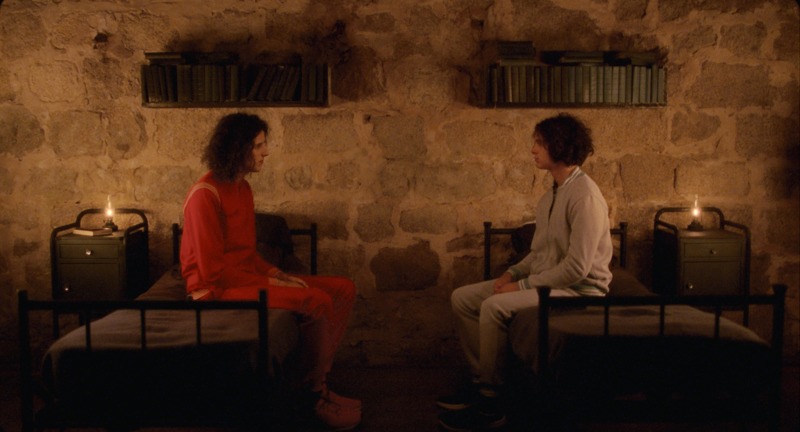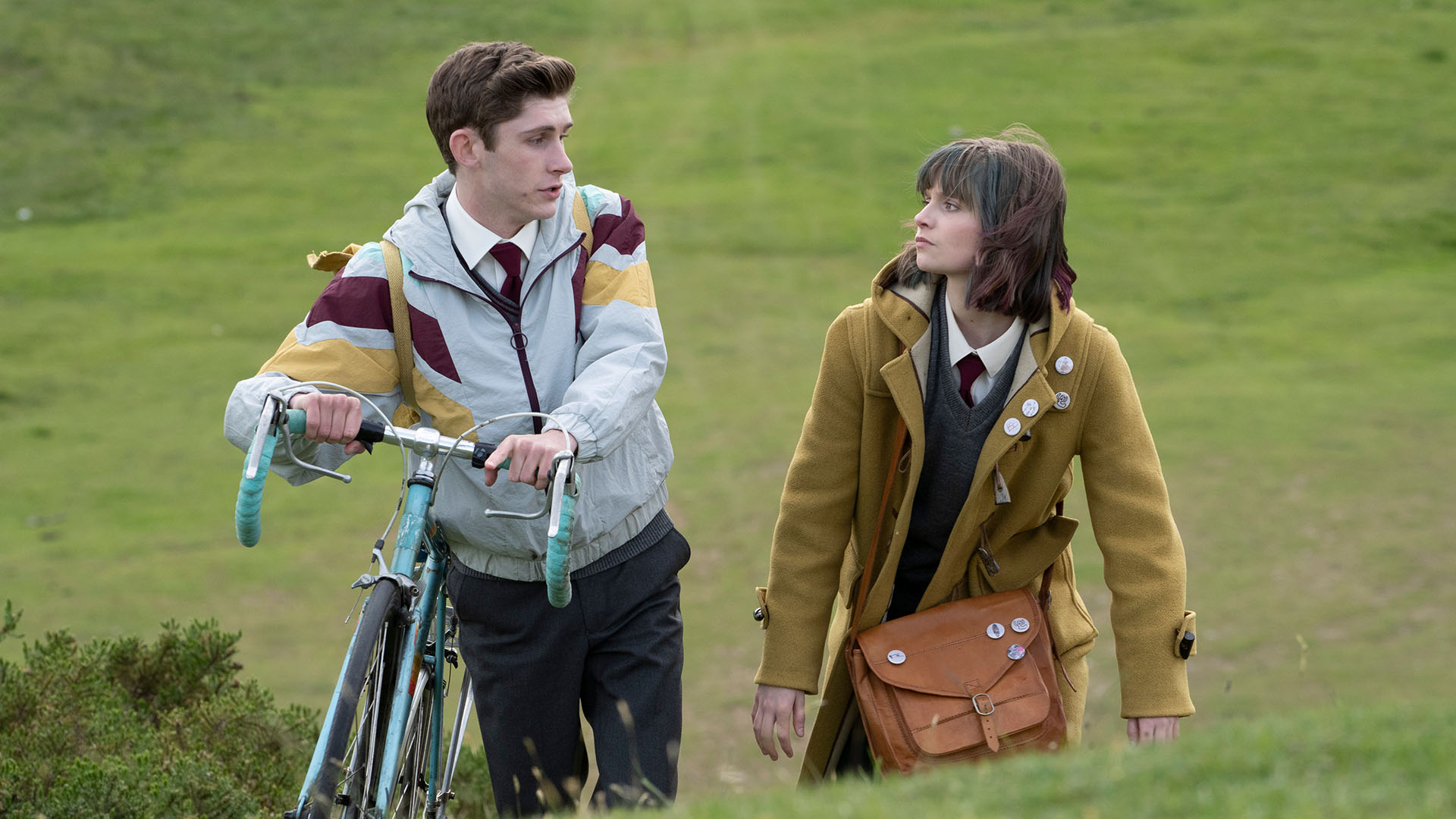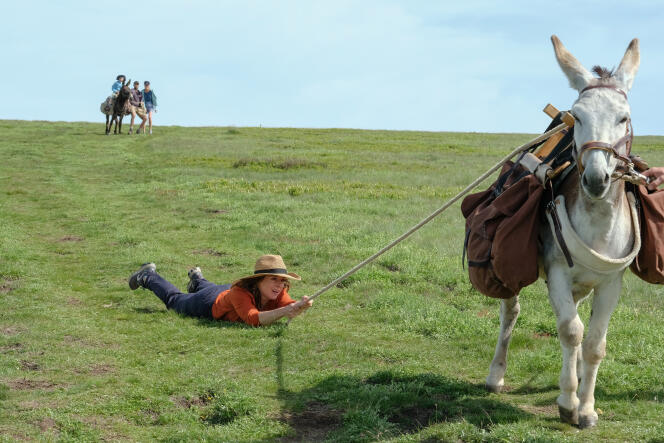Some reviews from my recent 2020 viewings:
Maryjki / Marygoround (2020, Daria Woszek)

Half oversaturated, artificial depresso-realism - half neon nightmare, Marygoround is a visually stunning and mad trip into a menopausal woman's psyche. We follow Maria, a 50-year old, highly religious virgin working in a small grocery shop - that could easily be mistaken as a set from a Paul Vecchiali film from the 80s, with a pinch of Kaurismaki dryness. Life seems a lull, but things start to unravel and breakthrough mundanity with menopause hits, and she not only starts to get urges she never felt before.
The result is utter fantasy, mood swings, hallucinations and rasher and rasher acts - played for both comedy and horror - but never without sympathy. This 80-minute film won't fly by - rather it will click you down with utter unease as you start to feel every second - and wonder just what will happen next. It is dynamic enough to genuinely leave you surprised, and to somehow, in all its deranged madness maintain a sense of, erm, charm? This is a balancing act unlike most you've seen, and frankly, regardless of some pulpier elements, it succeeds in both styles - and marvellously well. 8/10.
Shirley (2020, Josephine Decker)

Few active directors have built up a career of semi-experimental unnerving breakdowns of reality, and what we indeed see than Josephine Decker. This is a director who knows how to build visual tension, play with form and make the conventional feel harrowing, unstable and just a little terrifying. These final three attributes also describe Elisabeth Moss's performance as real-life novelist Shirley Jackson - and it is frankly, the first time Decker has been blessed with such a magnificent performance - holding all else together. In fact, she has not just one phenomenal performance, she has two. The excellent Michael Stuhlbarg plays her husband, and together the two of them build up a degree of sick joy in torment comparable to Who's Afraid of Virginia Woolf on the unsuspecting couple coming into their home.
You genuinely never know where you have them, what they will do next, what their goals are. Moss' Shirley is sickly, yet biting. Barely able to move, torturing herself, but finding utter delight in torturing others. Stuhlberg's Stanley on the other hand is far more deceptive. The life of the party, filled with charisma, but ready to stab you in the gut at any time. In fact, he can shift from charming to enabling to the real-devil at any point in time - and the two of them get so much material to work with. Moss performance is the main attraction, worthy of a best actress nomination, if not a win. She is thoroughly offputting, yet incredibly charismatic. She can be monstrous and yet inspire everything from empathy to pity to respect. Powerful, weak, genius - all attributes shine through as we get a dynamic and consistently powerful portrayal of the writer, her life and her obsessions.
The couple entering their home, played by Odessa Young and Logan Lerman leave far less of an impression - but then they also have far less material to work with. Still, the friendship that develops between Moss and Young would have been even stronger if the latter had just a little more to give. However, she is still perfectly solid in her role, as is Lerman, as mostly unsuspecting foils that slowly get taken in. There are also other slighter or less explored areas within the film, such as the creation of Shirley's new book, which often gets centre stage, as does the case it is based on - but drown out in the rest of the intrigue. These elements could easily have been magnified or dropped - though the final flashes are still rewatched - and as a whole this may both be Moss' best performance and Decker's greatest work to date. 8/10.
Atarrabi & Mikelats (2020, Eugène Green)

Huillet-Straub in a tracksuit? Pretty much, and with a moderate supply of jokes thrown in as well. At one point, our hero, Atarrabi, enters the devil's office, as he sits on his computer, complete with red suit (no tracksuit for him), and of course, red headphones. Atarrabi must speak up to get noticed, at which point the devil removes his headphones and says (something akin to): "I like to listen to RAP MUSIC when I work. We are on the edge of hipness here".
The entire film is however still done with stripped-down minimalist monotone delivery and settings as it adapts the Basque legend of Atarrabi & Mikelats. Non-professional actors are used, and despite being a French production it is shot entirely in the Basque language. The "stripped down" nature, also removes the pretence of sets. The traditional settings and themes are brought to life - in a, well, modern setting. The intro is literally on a motorway - through the sense of old runs through its very fabric. In fact, if Eugène Green was not exclusively listed as the author, I would have assumed he had simply modernised an ancient play. The dialogue is intentionally jarring with the clothing - and the lighting and look for innocence and simplicity is almost reminiscent of Rohmer's fairly faithful adaptation of The Romance of Astrée and Céladon.
Apparently, merging old and new this is nothing new for Eugène Green, and I am intrigued by what he has done before (of which I have seen none). He displays a great deal of talent here - and the film is often stunning - at other times pretty fun - but the mixture feels uneven and off. The deadpan purity and delivery mixes very poorly with a campy humour - and the end result of this being that it feels like it is trying to be too many things. 80% minimalist drama, 20% campy comedy - and the parts don't play too well - in fact they can even feel a little tacky. However, it is never dull, harnesses a lot of cinematic power and is certainly creative and even charismatic - to the point that its weaker scenes are quite forgivable. All in all a mild delight. 7/10.
Notturno (2020, Gianfranco Rosi)

Nottorno is a biting, contemplative travelogue from the middle east - giving you images of war, devastation and grief - as well as intimacy, mundanity and continuation. Brooding and atmospheric, we move from country to country, never with title cards, but occasionally with clear hints - such as uniforms and flags.
The one constant is a play being arranged at a clinic for refugees, where people with traumas from the ongoing wars seek to take back a form of dignity.
The film has fluctuation power, with certain scenes being genuinely genius, either in their unnerving or tragic nature - or beautiful by contrast - especially certain nocturnal scenes - and a haunting scene of widows and mothers near the beginning - while others feel like they are overstaying their welcome. While consistently good, the quiet nature of fleeting images lacks a degree of structure, and while the intentions behind the play and its presentation are sweet - and interesting ideas are pushed - it can really form the "narrative" on its own. As such, it falls short of greatness for me. 7/10.
Dating Amber (2020, David Freyne)

Caught in hyper-conservative Ireland, two closeted teenagers, tired of being bullied over their assumed sexuality, decide to participate in a deceptive act of self-preservation: to pretend to be a couple. Set in the midst of the 90s, with a backdrop in everything from militarism and Blur, it takes on all the standard high school tropes, but in a fairly charming and empathetic way - lead forth by the reasonably charismatic and likeable leads.
It does have the cinematography and sense of form of a high production Irish TV show, ala Derry Girls (though the exposition in the opening scene itself is very well done) - and as such is entirely dependent on plot, dialogue, narrative - and I suppose also a sense of 90s nostalgia - to carry through - and in this, it manages perfectly well. It is nothing unique, beyond perhaps the central premise, but it plays well and is a charming and frequently funny film. 6.5/10.
Antoinette dans les Cévennes / My Donkey, My Lover & I (2020, Caroline Vignal)

A light comical farce so stereotypically French you'd think it was made explicitly for export. A school teacher, with a "slightly" unhealthy attachment to her married lover (also the father of one of her pupils) decides to catch up with their family vacation as they trek through the countryside on a donkey. The result is more cute and quirky than downright hilarious, but it is a charming enough romp. 6/10.
Silence and Sunset (2020, Kazufumi Umemura)

The most breathtaking images from Kazufumi Umemura slow, contemplative and almost dialogue-free feature debut, are the shots of and in nature. The way he shoots light on greenery is absolutely sublime - and the long takes of cityscapes are well-composed as well. The main weakness is however in the handling of the actors, especially certain scenes that may or may not be intended for comedic effect. It is also a rather slight film, without a clear purpose or goal beyond being a well-made contemplative film - but what it does well is done beautifully well - and consistently so. 6/10.

















